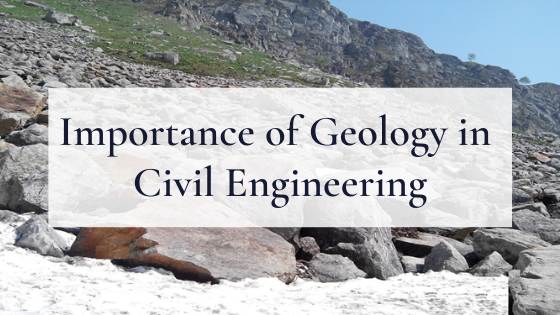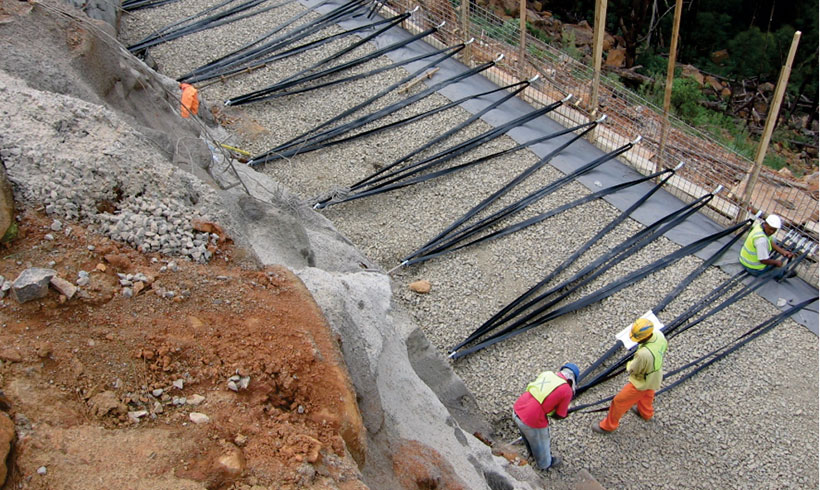All About Specialized Geotechnical Engineering Solutions
All About Specialized Geotechnical Engineering Solutions
Blog Article
Indicators on Specialized Geotechnical Engineering Solutions You Should Know
Table of ContentsOur Specialized Geotechnical Engineering Solutions PDFsHow Specialized Geotechnical Engineering Solutions can Save You Time, Stress, and Money.The Ultimate Guide To Specialized Geotechnical Engineering SolutionsSome Known Details About Specialized Geotechnical Engineering Solutions
They conduct site investigations, gather examples, execute laboratory tests, and evaluate data to assess the suitability of the ground for building jobs. Based on their findings, geotechnical engineers offer suggestions for foundation design, slope security, retaining structures, and reduction of geotechnical risks. They work together with various other professionals, such as architects, architectural designers, and building teams, to ensure that geotechnical considerations are integrated right into the overall task design and application.
Foundation Design: Geotechnical designers play a critical duty in making structures that can securely support the intended framework. They analyze the dirt conditions and load needs to establish the proper foundation type, such as superficial structures (e.g., footings), deep structures (e.g., stacks), or specialized methods like soil renovation. They think about elements such as settlement restrictions, bearing capacity, and soil-structure communication to establish optimal structure styles.
All about Specialized Geotechnical Engineering Solutions
Below are some kinds of geotechnical designers: Structure Engineer: Structure designers focus on making and evaluating structures for structures - Specialized Geotechnical Engineering Solutions. They evaluate the dirt conditions, tons needs, and website qualities to establish the most proper structure type and design, such as shallow structures, deep structures, or specialized techniques like stack structures
They execute field testing, gather examples, and examine the accumulated information to characterize the soil buildings, geologic formations, and groundwater conditions at a site. Geotechnical Instrumentation Engineer: Geotechnical instrumentation designers concentrate on surveillance and gauging the behavior of soil, rock, and structures. They set up and preserve instrumentation systems that keep an eye on variables such as dirt negotiation, groundwater levels, incline movements, and structural displacements to evaluate performance and offer early warnings of prospective problems.
In the office atmosphere, geotechnical engineers use specialized software application tools to carry out computations, produce styles, and evaluate data. Specialized Geotechnical Engineering Solutions. They prepare reports, review project specifications, communicate with customers and staff member, and coordinate task tasks. The office setting provides a conducive setting for study, analysis, and collaboration with other professionals associated with the project
They often go to project sites to perform website investigations, evaluate geotechnical conditions, and collect information for analysis. These check outs include traveling to various places, in some cases in remote or challenging surfaces. Geotechnical designers may perform dirt sampling, conduct tests, and display building activities to ensure that the geotechnical facets of the job are being implemented appropriately.
Things about Specialized Geotechnical Engineering Solutions
Geotechnical designers additionally operate in specialized geotechnical research laboratories. In these facilities, they carry out experiments, execute tests on dirt and rock examples, and evaluate the design residential or commercial properties of the products. Geotechnical research laboratory engineers work thoroughly in these settings, dealing with screening tools, operating instruments, and taping information. They collaborate with other research laboratory personnel to make certain accurate and dependable testing outcomes.
Retaining Walls: Creating walls that hold back soil to avoid landslides and supply security on sloped surfaces. Embankments and Earthworks: Creating embankments for roadways, trains, and dams to guarantee they continue to be secure under stress. The mining industry relies heavily on geotechnical design to ensure the safety and longevity of its procedures.
With this in mind, we have actually designed our program to prepare pupils for success. The Geotechnical Design program at the College of Delaware uses chances for sophisticated research study and research study in: Soil and rock mechanics Soil-structure communication Visit Your URL Integral modeling over here Computational geomechanics Structure and earth structures design Ground enhancement Incline security and landslide stabilization Liquefaction of dirts and earthquake design Laboratory characterization of geomaterials and soil reinforcement Ecological geotechnics Given the solid requirement for enhancement to our country's infrastructurethe American Culture of Civil Engineers offered the U.S.
Geotechnical design is a branch of civil design; nevertheless, it involves making use of clinical approaches and concepts to collect and translate the physical residential properties of the ground. Geotechnical designers are involved in all phases of the style of structures, from concept to construction. Their work is vital in the design and preparation process as they examine the stability of dirt, clay, silt, sand, and rock, before construction commencing.
Unknown Facts About Specialized Geotechnical Engineering Solutions
This is complied with by a ground investigation based upon the findings of the desk research and entails test matching and sampling to reveal any prospective issues. Geotechnical designers work within multidisciplinary groups, supported by intermediate and junior designers as well as by CAD service technicians. As a senior geotechnical engineer on a hydro plant job, tasks may include joining technological reviews (e.g., peer testimonials), tailings dam assessments, dam safety evaluations, and various other studies connected to the design and from this source construction of mine waste centers.
While some specialists are experts entirely in geotechnics, others may work under titles like engineering rock hound or ground designer within comparable capacities. As a geotechnical engineer, you'll require to: construct and maintain connections with clients and other professionals associated with the website, throughout each projectmaintain safety and security criteria on website bear in mind cost ramifications when you make recommendationsstudy geological maps and airborne photos from a variety of resources and from various time periodsexamine construction prepares to see exactly how viable they are based on your understanding of the siteinvestigate threats or geological risks for the sitesearch for eco sensitive functions, such as landfill beginning to create valid and interpretive ground modelsplan field investigationsdrill and analyse samples of bedrock, soil, groundwater and extra products manage various other professionals on sitesolve technical concerns as they occur, such as unexpected frameworks at drill sitesmonitor problems throughout and after building and construction to make certain frameworks are steady in the short and long termadd data gathered on site to your first researchcreate geotechnical calculations, illustrations, and two or three-dimensional computer models analyzing the datamake referrals concerning the proposed use of the website.
There are great deals of opportunities to fulfill brand-new individuals, as you'll collaborate with a range of experts at every website. The work can be demanding as you may be accountable for the safety of others while on website. There is additionally a high degree of monetary responsibility, as the referrals you make can have severe price ramifications.

Report this page